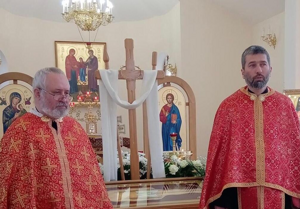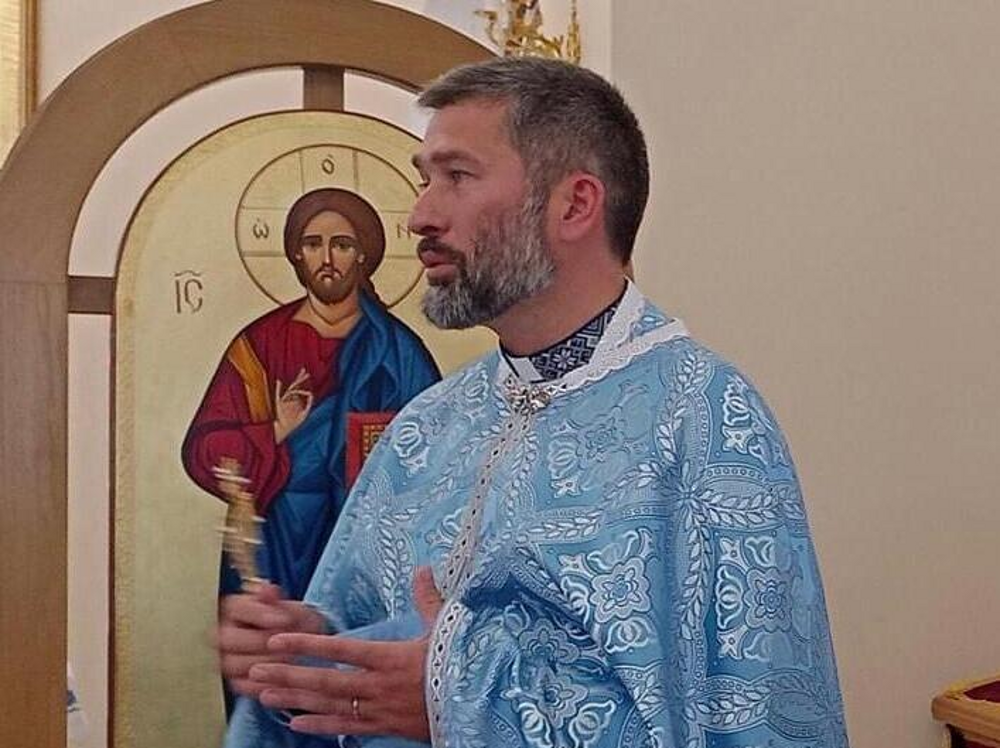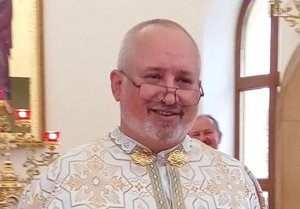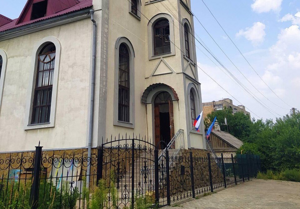After 4 months, are "disappeared" Greek Catholic priests still alive?.

Four months after Russia's Rosgvardiya in Berdyansk seized two Ukrainian Greek Catholic priests, Fr Ivan Levytsky and Fr Bohdan Heleta, their diocese has no information on them or even if they are still alive. The Russian Military Command in Melitopol refused to discuss their enforced disappearance. "This is not a question for us," the duty officer told Forum 18. No news has been heard since January of "disappeared" Orthodox Church of Ukraine priest Platon Danyshchuk. Russia's Kherson Region police raided the fourth empty Jehovah's Witness Kingdom Hall, seizing religious literature.
Troops of Russia's National Guard (Rosgvardiya) seized two Ukrainian Greek Catholic priests in Berdyansk in Zaporizhzhia Region in November 2022. Four months later, their diocese has received no information about them, or even if they are still alive. Forum 18 has not been able to find out where Fr Ivan Levytsky and Fr Bohdan Heleta have been held, what their state of health is, or whether they have been released at an unknown location.
"We have no information, but we hope that our fathers are alive and soon will be released," a diocesan representative told Forum 18 from Zaporizhzhia.
The duty officer at the Russian Military Command in Melitopol refused to discuss the enforced disappearance of the two priests. "This is not a question for us," the officer told Forum 18. "We have no information." He refused to give any number for the Military Command in Berdyansk or for Rosgvardiya and put the phone down. Berdyansk's Russian-controlled police did not answer the phone or respond to written questions.
Officials of the Russian Zaporizhzhia Regional Administration in Melitopol refused to put Forum 18 through to Artyom Sharlay, the head of the Religious Organisations Department at the Administration's Social and Political Communications and Information Policy Department. He has spoken out in Russian interviews against "religious sects" which he claimed were used by foreign "special services" and hid weapons in their places of worship.
Fr Levytsky and Fr Heleta "decided to stay with their people in the temporarily occupied territories", the head of the Greek Catholic Church, Major Archbishop Sviatoslav Shevchuk, said in a December 2022 appeal for help to diplomats and human rights defenders. "They served both the Greek Catholic and Roman Catholic communities, bringing a light of hope to people under occupation".
Apart from Fr Levytsky and Fr Heleta, all the other Greek Catholic priests have now left the occupied parts of Luhansk, Donetsk and Zaporizhzhia Regions. "Some left for their own safety, others were forced to leave," the diocese told Forum 18.
On 26 January, the Russian military seized Fr Platon Danyshchuk, Orthodox Church of Ukraine priest of Holy Trinity Church in the village of Dobropillya in occupied Kherson Region. Two months later, Forum 18 has not been able to find out where he has been held, what his state of health is, or whether he has been released at an unknown location – or even if he is still alive.
The telephone at the Russian Kherson Regional Police went unanswered each time Forum 18 called.
In January, Russian troops seized the last of the three Baptist churches in Lysychansk in occupied Luhansk Region. Transfiguration Church – which gained Ukrainian registration in 1998 - is located in a residential district on the southern edge of the city. "The Russian military now live there," the Church's pastor Yuri Sisoyev told Forum 18 from government-controlled Ukraine, to where he fled in April 2022. "None of the three Baptist places of worship in the town are able to function and they don't allow anyone in".
Oleg Pomnikov, head of the Religious and Ethnic Affairs Department of the Luhansk People's Republic Culture, Sport and Youth Ministry, refused absolutely to discuss anything with Forum 18 and put the phone down.
At least for part of the eight-month Russian occupation of Kherson in 2022, the occupation authorities banned relatives and priests from attending burials in cemeteries, without issuing any public announcement. It appears they did not explain their ban. "Neither relatives nor the priest, no one was allowed into the cemetery," Fr Ioann Zamarayev, a priest of the Orthodox Church of Ukraine who lived through the occupation of the city, recalled. He said workers buried bodies in the absence of relatives or priests.
In February, officers of Russia's Kherson Regional Police raided the empty Jehovah's Witness Kingdom Hall in Skadovsk in the occupied Kherson Region. It claimed it had "halted the functioning of the head office of the local cell of the Jehovah's Witness organisation, whose activity was banned on Russian territory from April 2017 on the decision of Russian Supreme Court". Police seized religious publications. A possible criminal case is being prepared.
This was the fourth known police raid on an empty Kingdom Hall in occupied parts of Kherson Region. Jehovah's Witnesses have not used their Kingdom Halls since 2020 because of the coronavirus pandemic.
In March, police and local administration officials seized Jehovah's Witness literature from a children's library in Skadovsk District. The telephone at the Russian Kherson Regional Police went unanswered each time Forum 18 called. Also unanswered was the telephone of Skadovsk District Administration.
Russian restrictions on freedom of religion or belief imposed on occupied Ukraine
Freedom of religion or belief violations in the Ukrainian territories Russia has occupied since 2014 have not followed one pattern.
In occupied and illegally annexed Crimea, the Russian government has forcibly imposed Russian laws and restrictions on exercising human rights, including freedom of religion or belief.
In the occupied parts of the eastern Ukrainian territories of Luhansk (under the Russian-created Luhansk People's Republic - LPR) and Donetsk (under the Russian-created Donetsk People's Republic - LPR) serious violations of freedom of religion and belief and other human rights have also taken place since 2014.
Russia's February 2022 renewed invasion of Ukraine saw more Ukrainian territories brought under Russian occupation. As of late March 2023, Russia controls about 17 per cent of Ukrainian territory:
- 100 per cent of Crimea (including Sevastopol);
- almost all of Luhansk Region;
- about 60 per cent of Donetsk Region;
- about 70 per cent of Zaporizhzhia Region;
- about 70 per cent of Kherson Region;
and small parts of Mykolaiv and Kharkiv Regions.
On 5 October 2022, following referenda that were widely denounced by the international community, Russia illegally annexed the DPR and LPR, retaining these names, along with Ukraine's Zaporizhzhia and Kherson Regions. "The so-called 'referenda' in Ukraine were conducted in areas under Russian occupation," United Nations Secretary-General António Guterres said on Twitter on 29 September 2022. "They can't be called a genuine expression of the popular will."
In 2023, Russia is following a more coordinated approach to impose the full range of Russian restrictions on the exercise of freedom of religion or belief across all the Russian-occupied areas of Ukraine.
Russian occupation officials in 2023 now insist that Russian law applies to the occupied territories, and that religious communities must have registration under Russian law.
The Office of the UN High Commissioner for Human Rights (OHCHR) has condemned "the unlawful application of Russian Federation legislation by the occupation authorities of the Russian Federation in the occupied territory [Crimea]" in its Report on the human rights situation in Ukraine for 1 August 2020 to 31 January 2021.
Berdyansk: "Disappeared" clergy still "disappeared" after four months
Two Ukrainian Greek Catholic priests seized in Berdyansk in Zaporizhzhia Region in late 2022 appear to remain in Russian detention, if they are still alive. Forum 18 has not been able to find out where Fr Ivan Levytsky and Fr Bohdan Heleta have been held, what their state of health is, or whether they have been released at an unknown location.
Troops of Russia's National Guard (Rosgvardiya) seized the two Ukrainian Greek Catholic priests, Fr Levytsky and Fr Heleta, in Berdyansk on 16 November 2022.

"These two priests decided to stay with their people in the temporarily occupied territories," the head of the Greek Catholic Church, Major Archbishop Sviatoslav Shevchuk, said on 1 December 2022 in an appeal for help to diplomats and human rights defenders. "They served both the Greek Catholic and Roman Catholic communities, bringing a light of hope to people under occupation. They were arrested, then some military items were planted in the church, and they begin to accuse these fathers of illegal possession of weapons." He feared that Russian troops were torturing the two priests.
The Greek Catholic Donetsk Exarchate has had no news of Fr Levytsky and Fr Heleta since Russia's National Guard seized them. "We have no information, but we hope that our fathers are alive and soon will be released," a diocesan representative told Forum 18 from Zaporizhzhia on 21 March 2023.
On 21 March, the Exarch of Donetsk, Bishop Stepan Meniok, appealed for prayers for Fr Levytsky and Fr Heleta. "I come to church early and pray alone and complain to Jesus why our prayers are not heard when we ask for their release from captivity," he told church members. "It is difficult to understand the plans of God," he added.
Forum 18 was unable to reach Ruslan Sleptsov, acting head of Zaporizhzhia Region's Rosgvardiya, or other officials there, as no officials at Rosgvardiya in Moscow or Rostov-on-Don would give the contact details.

Officers of Berdyansk's Russian-imposed police did not answer the phone each time Forum 18 called on 23 March. Forum 18 again asked in writing the same day where Fr Levytsky and Fr Heleta are, why they have not been freed and whether they are still alive. Forum 18 had received no reply by the end of the working day in Berdyansk of 23 March.
The duty officer at the Russian Military Command in Melitopol refused to discuss the enforced disappearance of the two priests. "This is not a question for us," the officer, who did not give his name, told Forum 18 on 23 March. "We have no information." He refused to give any number for the Military Command in Berdyansk or for Rosgvardiya and put the phone down.
Officials of the Russian Zaporizhzhia Regional Administration in Melitopol refused to put Forum 18 through on 23 March to Artyom Sharlay, the head of the Religious Organisations Department at the Administration's Social and Political Communications and Information Policy Department. He has spoken out in Russian interviews against "religious sects" which he claimed were used by foreign "special services" and hid weapons in their places of worship.
Armed Russian soldiers seized Serhiy Karpenko, Pastor of the Vefil (Bethel) Protestant Church, in Berdyansk on 12 December 2022. He was freed on 10 January 2023.
Kherson Region: Orthodox priest still "disappeared"
On 26 January, the Russian military seized Fr Platon Danyshchuk, Orthodox Church of Ukraine priest of Holy Trinity Church in the village of Dobropillya in occupied Kherson Region, Fr Ioan Zamarayev of the OCU's Kherson Diocese confirmed on 5 February.
Forum 18 has not been able to find out where Fr Platon has been held, what his state of health is, or whether he has been released at an unknown location. The telephone at the Russian Kherson Regional Police went unanswered each time Forum 18 called on 23 March.
Lysychansk: Russian troops seize third Baptist church
In January, Russian troops seized the last of the three Baptist churches in Lysychansk in Ukraine's Luhansk Region. Transfiguration Church – which gained Ukrainian registration in 1998 - is located in a residential district on the southern edge of the city.

"The Russian military now live there," the Church's pastor Yuri Sisoyev told Forum 18 on 22 March from government-controlled Ukraine, to where he fled in April 2022. "None of the three Baptist places of worship in the town are able to function and they don't allow anyone in."
Oleg Pomnikov, head of the Religious and Ethnic Affairs Department of the LPR Culture, Sport and Youth Ministry, refused absolutely to discuss anything with Forum 18 on 23 March and put the phone down.
Russian and Russian-backed forces occupied Lysychansk in early July 2022. Within days they seized the Central Baptist church, the largest Protestant church in the city, adapting it for their use.
Men in military dress – who did not identify themselves – broke down the door to gain entry, the Church's Pastor Eduard Nosachov – who had fled the town to Ukrainian government-held territory in April 2022 because of the fighting – told Forum 18 in October 2022. They placed Russian and LPR flags on the front and planned to pull down the cross from the steeple. "They threw out all our possessions, including all our Christian literature, including Bibles and educational materials," Pastor Nosachov added. The Baptist Church is now being used by the Russian-controlled city administration.
In late July 2022, Russian forces seized Grace Baptist church in a residential district of Lysychansk – originally established by Pastor Nosachov's congregation. Russian officials claimed it would be used as a kindergarten.
Kherson: Relatives, priest barred from cemetery burials during occupation
At least for part of the time between March and November 2022, when the city of Kherson was under Russian occupation, the occupation authorities banned relatives and priests from attending burials in cemeteries, without issuing any public announcement. It appears they did not explain their ban.
"Neither relatives nor the priest, no one was allowed into the cemetery," Fr Ioann Zamarayev, a priest of the Orthodox Church of Ukraine who lived through the occupation of the city, told the Russian priest Yakov Krotov in a YouTube interview on 24 January 2023. "A bus came up to the grave and only appropriate people were allowed to approach the grave." He declined to speculate why the occupation authorities might have imposed these restrictions.
Kherson Region: Hunt for Jehovah's Witnesses continues
Officers of Russia's Kherson Regional Police raided the empty Kingdom Hall in the town of Skadovsk in the southern part of the occupied Kherson Region, it announced on 8 February. It claimed it had "halted the functioning of the head office of the local cell of the Jehovah's Witness organisation, whose activity was banned on Russian territory from April 2017 on the decision of Russian Supreme Court".
The Regional Police said the building had been used for meetings and for storing "agitational materials and extremist literature". Police seized publications, as well as portable display stands that Jehovah's Witnesses use when offering literature on the streets. An accompanying video shows masked men in camouflage looking at Jehovah's Witness literature, videos and cassette tapes piled on the floor of the lobby.
Jehovah's Witnesses across Ukraine stopped meeting in Kingdom Halls in early 2020 because of the coronavirus pandemic. Following the Russian invasion of Ukraine in February 2022, Kingdom Halls did not resume their activity in the regions occupied by Russia.
Police said an investigation was underway in relation to the Skadovsk Jehovah's Witness community and a criminal case was being considered under Russian Criminal Code Article 282.2, Part 1 ("Organisation of the activity of a social or religious association or other organisation in relation to which a court has adopted a decision legally in force on liquidation or ban on the activity in connection with the carrying out of extremist activity"). This Article carries a possible punishment of six to 10 years' imprisonment or a fine of 400,000 to 800,000 Russian Roubles. The Regional Police did not identify any individuals as being under investigation.
In March, officials seized Jehovah's Witness literature from a children's library in Skadovsk District.
The telephone at the Russian Kherson Regional Police went unanswered each time Forum 18 called on 23 March. Also unanswered the same day was the telephone of Skadovsk District Administration.
In November 2022, Kherson Regional Police conducted "operational investigation measures" in the village of Krasne on the Black Sea coast which uncovered a group of Jehovah's Witnesses. Officers seized "banned" religious literature.
On 23 January 2023, Kherson Regional Police announced that they had raided twho Kingdom Halls: in the village of Novosofiivka close to the southern Black Sea coast and in the village of Oleshky, close to the Dnipro River.
Occupation officials have repeatedly stated since 2022 that any crimes or offences in occupied parts of Ukraine will be punished under Russia's Criminal or Administrative Codes. Forum 18 is not aware that the occupation authorities have brought to Russian courts in occupied parts of Kherson, Zaporizhzhia, Luhansk or Donetsk Regions, any criminal or administrative cases to punish the exercise of freedom of religion or belief since Russia's renewed invasion of Ukraine in February 2022.
Kherson Region: Library purges continue
The Russian occupation authorities are continuing their purges of libraries to remove books they consider "extremist" or otherwise dislike. Many of these books cover Ukrainian 20th-century and 21st-century history, including those on Ukrainian religious leaders. The occupation authorities also remove books related to religious communities Russian courts have banned as "extremist", such as Jehovah's Witnesses (banned by Russia's Supreme Court in 2017).
Russian anti-extremism police and occupation local administration officials raided a children's library in Skadovsk District of Kherson Region, the Russian Kherson Region Interior Ministry announced on 19 March. It claims to have found more than 20 publications "banned for distribution on the territory of the Russian Federation". It added that "specialists are working on the illegal literature discovered".
An accompanying video shows officers removing three Jehovah's Witness publications from the Religion section of the library: "My Book of Bible Stories" (in Ukrainian), "Is There a Creator Who Cares About You?" and "The Greatest Man Who Ever Lived" (both in Russian).
The telephone of Skadovsk District Administration went unanswered each time Forum 18 called on 23 March.
On 20 January, Luhansk People's Republic Education and Science Ministry instructed the heads of educational establishments to remove "literature of an extremist nature, expressing the ideology of Ukrainian nationalism" from their libraries.
The list of "extremist" books to be removed includes one on Metropolitan Andrey Sheptytsky (who headed the Ukrainian Greek Catholic Church until his death in 1944). Among books from the Famous Ukrainians series to be removed are one on Metropolitan Sheptytsky and another on St Petro Mohyla, a 17th century Orthodox Metropolitan of Kyiv who was known for his educational and publishing activities.
The Russian-imposed LPR Culture Minister Dmitry Sidorov told a meeting chaired by Russia's Culture Minister Olga Lyubimova on 20 January that public libraries have already removed "extremist" literature.
Oleg Pomnikov, the head of the Religious and Ethnic Affairs Department of the LPR Culture, Sport and Youth Ministry, defended the removal from libraries of "extremist" books. "Sheptytsky was an active supporter of Nazism and of Ukrainian nationalism," he claimed to Forum 18 in February. "The Greek Catholic Church supported the Banderists." He made no comment about St Petro Mohyla.
In May 2022, Donetsk People's Republic Culture Ministry began a programme of removing from public libraries literature that it regards as "extremist". These included not only books on Ukrainian culture and history and books about Adolf Hitler, but books on "political and religious figures".
Author: Felix Corley
Source: Forum 18